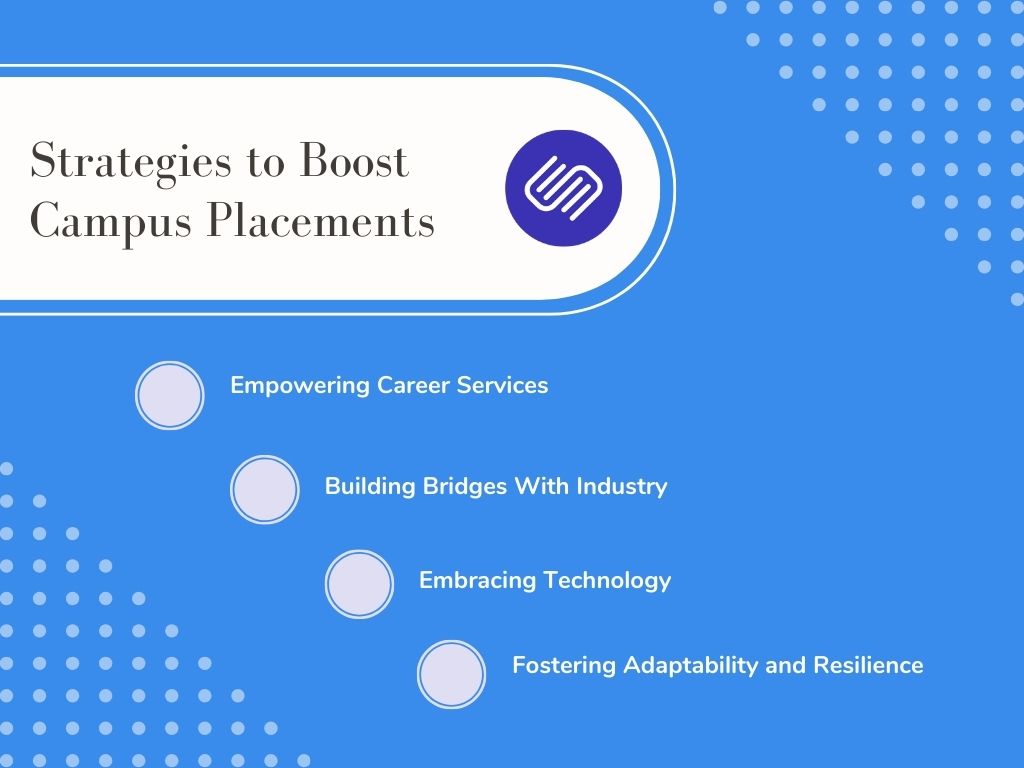In the ever-changing landscape of campus placements, adapting to new norms has become the key to unlocking opportunities for students and ensuring that educational institutions continue to play a vital role in preparing the workforce of tomorrow. Corporate hiring shifts, influenced by technological advancements such as campus placement portal, remote work trends, and evolving skill set requirements, have presented both challenges and opportunities. This article delves into how students and institutions can rise to the occasion, offering strategies and insights for success in this dynamic environment.
Understanding Corporate Hiring Shifts
The Shifting Sands of the Job Market
The corporate job market is undergoing a profound transformation. The rise of artificial intelligence and automation has redefined job roles, demanding a broader skillset than ever before. The remote work revolution, accelerated by the COVID-19 pandemic, has opened up new possibilities and challenges for employers and job seekers alike. In addition, economic conditions, such as recessions and recoveries, can have a significant impact on hiring trends. All of these factors make it essential for educational institutions to stay attuned to the evolving needs of the job market.
Challenges Faced by Educational Institutions
Aligning Academia with Industry
One of the primary challenges for educational institutions is ensuring that their curriculum remains relevant. Outdated coursework can leave students ill-prepared for the rapidly changing job market. To bridge this gap, institutions must engage with industry professionals to understand current trends and adapt their offerings accordingly.
Navigating the Digital Divide
The transition to remote work has made digital literacy a core requirement for many positions. Educational institutions must provide resources and training to ensure that students are well-equipped to handle remote work environments effectively.
Bridging Academia and Industry
The disconnect between what students learn in the classroom and what employers require in the workplace is a long-standing issue. To address this, institutions should facilitate collaborations with industry partners, offer guest lectures and workshops, and encourage students to participate in internships and co-op programs. These initiatives provide students with real-world experiences and insights that are invaluable when they enter the job market.
Strategies to Boost Campus Placements

Empowering Career Services
A robust campus placement department can significantly enhance campus placements. Offering career counseling, guidance, skill development workshops, resume-building assistance, and interview preparation can give students the edge they need to secure their dream jobs.
Building Bridges with Industry
Institutions can establish strong ties with alumni networks and industry partners. Alumni can provide valuable mentorship and networking opportunities, while partnerships with companies can result in campus placements and internships for students. Guest lectures and workshops featuring industry experts can also offer students valuable insights and connections.
Embracing Technology
The digital age has brought about a slew of technological tools that can streamline campus placement processes. Online placement and virtual career fairs make it easier for students to connect with potential employers. Additionally, data analytics can help institutions identify trends and tailor their programs accordingly.
Fostering Adaptability and Resilience
Perhaps the most critical skill for the modern job market is adaptability. Encouraging students to embrace continuous learning and cultivate a growth mindset can empower them to navigate the twists and turns of their careers successfully.
Case Studies: Successful Campus Placement Programs
Let’s take a look at some institutions that have embraced these strategies and witnessed remarkable success in campus placements:
1. Hudson University: By collaborating with tech giants, Hudson University revamped its computer science program to align with industry needs. The result? A surge in campus placements with leading tech companies.
2. Catalyst College: Catalyst College introduced a mandatory soft skills development course for all students. Graduates not only excel in their technical roles but also stand out in terms of communication, teamwork, and leadership skills.
3. TechHub Institute: TechHub Institute pioneered the use of campus placement automation in career fairs, connecting students with global employers without leaving their campus. Their innovative approach resulted in a significant increase in job offers for graduating students.
The Role of Soft Skills and Emotional Intelligence

In today’s job market, soft skills are no longer optional but essential. Employers are increasingly valuing qualities like effective communication, adaptability, and problem-solving. Thus, it’s imperative for educational institutions to incorporate soft skill development into their curriculum to help students stand out in a competitive job market.
Emotional intelligence (EQ) is another critical aspect of workplace success. It involves understanding and managing emotions, both one’s own and others’. EQ enhances interpersonal relationships, teamwork, and leadership, making it an invaluable asset for graduates entering the professional world.
Preparing Students for Remote Work
Remote work is here to stay, and students must be prepared to thrive in virtual work environments. Educational institutions can help by teaching remote work etiquette and productivity. Providing resources for creating conducive remote workspaces, time management skills, and effective communication in virtual settings can give students a competitive edge.
The Future of Campus Placements
The future holds exciting possibilities for campus placements. As technology continues to evolve, new job roles will emerge, requiring different skill sets. To stay ahead of the curve, educational institutions must remain agile, adaptable, and forward-thinking. Lifelong learning will become the norm, and institutions should be prepared to support students on their ongoing educational journeys.
Conclusion
In the face of corporate hiring shifts, navigating new norms in campus placements has become paramount. By understanding the evolving job market, addressing the challenges faced by educational institutions, and implementing effective strategies, students can find exciting opportunities, and institutions can continue to play a pivotal role in shaping the future workforce. Soft skills, emotional intelligence, and remote work readiness will be essential for graduates, ensuring that they not only secure jobs but thrive in them. As we look ahead, the future of campus placements is filled with promise, and those who adapt will be the ones who prosper in this dynamic environment.
Frequently Asked Questions
How can educational institutions keep up with the rapidly changing job market and evolving skill set requirements?
Educational institutions can stay relevant by maintaining a strong connection to industry trends and needs. This involves regular engagement with professionals from various industries through partnerships, guest lectures, and advisory boards. Additionally, institutions should be open to curriculum revisions and agile enough to introduce new courses or adapt existing ones to meet current demands. Keeping pace with the job market requires a commitment to lifelong learning and a willingness to evolve.
What should students do to prepare for the increasing prevalence of remote work opportunities?
To prepare for remote work, students can start by honing their digital literacy skills and familiarizing themselves with remote collaboration tools. Time management, self-discipline, and effective communication are key competencies for remote work success. Creating a dedicated and ergonomic workspace at home can also enhance productivity. Moreover, seeking internships or part-time jobs that involve remote work during their academic journey can provide valuable hands-on experience in virtual work environments.








